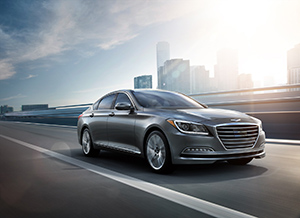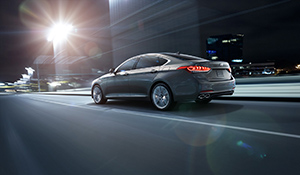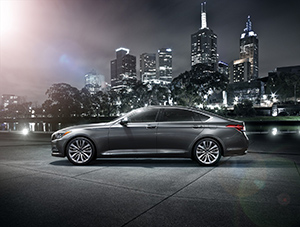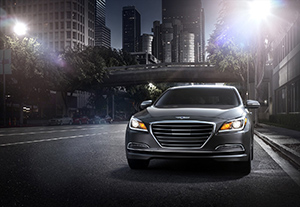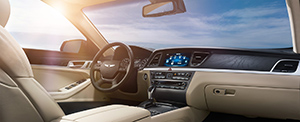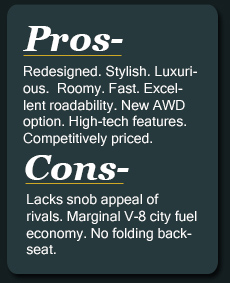2015 Hyundai Genesis
Redesigned 2015 Hyundai
Genesis edges closer to costlier foreign luxury sedans
Prices: $38,000-$51,500
The new, redesigned 2015 Hyundai Genesis is a fast, luxurious
sedan designed to compete with foreign rivals (mainly German) that cost
thousands more.
This Genesis has slicker, more imposing styling. It's
highlighted by a new, very aggressive-looking hexagonal grille and
dynamic rear design. The wheelbase is longer at 118.5 inches and there
are shorter body overhangs than its predecessor.
This big, imposing four-door is equipped with plenty of
luxury and convenience equipment. It's 196.5 inches long and weighs
from 4,138 to 4,541 pounds. It's not a sports sedan, but has excellent
roadability, due partly to nearly 50/50 weight distribution and a new
rear multi-link suspension.
All-Wheel Drive (AWD) is offered for the first time for the base
Genesis V-6 model. The more-powerful V-8 version comes only with
rear-wheel drive (RWD).
There is a new ultra-rigid platform, and the fully-independent 5-link
front and rear suspension designs have more stiffness, with increased
front and rear travel for greater bump absorption over a variety of
roads. The car rolls on stronger new 18- and 19-inch alloy wheels and
has electronic stability control. Also, a Continuous Damping Control
suspension offered for the Genesis V-8 helps increase control of body
motions and body roll, allowing sportier roadholding and a more
comfortable ride.
There are no disappointments in the power area. The $38,000 Genesis has
a sophisticated 3.8-liter V-6 with 311 horsepower and 293 pound-feet of
torque while the $51,500 Genesis has a 5-liter V8 with 420 horsepower
and 380 pound-feet of torque. My test Genesis had the V-8.
The V-6 uses regular-grade fuel and is expected to be chosen by most
Genesis buyers. It has been improved to deliver a flatter overall
torque curve at low r.p.m. for enhanced driveability. The
Genesis V-6 model is lighter than the V-8 version. It thus is a bit
more nimble. The V-6 model has standard RWD, with optional AWD, while
the V-8 model only comes with RWD.
Both engines work with an enhanced, butter-smooth eight-speed automatic
transmission with an easily used manual-shift feature that uses paddle
shifters. A new available Intelligent Drive mode lets a driver select
from four drive modes, depending on conditions and driving preferences.
Each mode alters transmission mapping, throttle responsiveness,
stability control and suspension damping settings.
The Genesis V-6 provides an estimated 18 miles per gallon in the city
and 29 on highways with RWD and 16 and 25 with AWD. The Genesis V-8
provides a mediocre 15 city, but 23 on
highways.
My test Genesis V-8 was truly muscular, moving the car from 0 to 60
m.p.h. in 5.5 seconds and providing seemingly effortless
passing abilities and highway cruising. However, the Genesis V-6 also
is lively, being several hundred pounds lighter than the V-8 model.
Curiously, my test car's nicely geared motor-driven electric power
steering felt "soggy" for a few miles when I initially drove the car,
then felt normal. The steering was quick, and the turning circle was
commendably tight.
Handling was remarkably good for a large luxury auto. It took tricky
decreasing radius turns in stride at above-average speeds and went
where you pointed it with no lag. The rather firm ride was supple, and
braking was strong, with good pedal feel. The anti-lock brakes have
brake assist and electronic brake distribution features.
Safety features include nine air bags. Offered is a new "Smart Cruise
Control" system that allows full function down to zero m.p.h. and
enables the Genesis to help maintain safer, consistent spacing with the
vehicle ahead. A new blind spot detection system helps monitor traffic
around the car, using radar sensors. And there's a parking assistance
system to safety get a driver in and out of tight spots.
The interior is spacious, ultra-quiet and luxurious, but
generally isn't quite up to the best European standards. Large door
handles help allow quick entry. Front seats provide good side and thigh
support, and all seats are comfortable.
It's easy to go faster than you think in the Genesis V-8, so it's nice
that a prominent digital speedometer keeps track of speed, along with a
conventional speedometer. The attractive gauges are easy to read in
bright sunlight. Inspired by aircraft technology, an optional heads-up
display projects a virtual image on the windshield, letting a driver
keep eyes concentrated on the road.
The steering wheel design and grip have been improved, and switchgear
has been redesigned and is easier to reach. The pushbutton engine
starter is convenient. There are a good number of small controls, but
they're clearly marked for simple use. The analog clock in the center
of the dashboard gives the interior a touch of old-fashioned class.
Power plugs are easy to reach near the dashboard.
The trunk is large, but there are no split folding rear seatbacks to
increase cargo room. However there's a moderately large pass-through
area from the trunk to the rear seat area.
A "Smart Trunk" system opens the trunk lid automatically if
the car's smart key is detected within a new feet of the rear bumper
for longer than three seconds for hands-free ease of opening. The
system lets a driver keep both feet on the ground, simply
waiting by the trunk a few seconds for it to open
automatically. Rivals with hands-free trunk opening use a
leg-kick sensor under the rear bumper to enable a driver to open the
lid, but Hyundai found this method to be difficult when someone is
carrying cumbersome packages.
Such clever touches likely help sell a car, especially if it's a solid
package like the Genesis. Also helpful in promoting sales is the
significant amount of money that can be saved by passing up costlier,
although better known, luxury class foreign cars. And not minding that
the Genesis doesn't have their prestigious nameplates.

